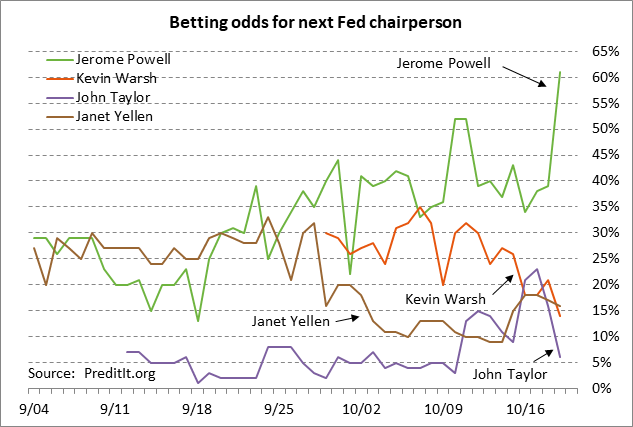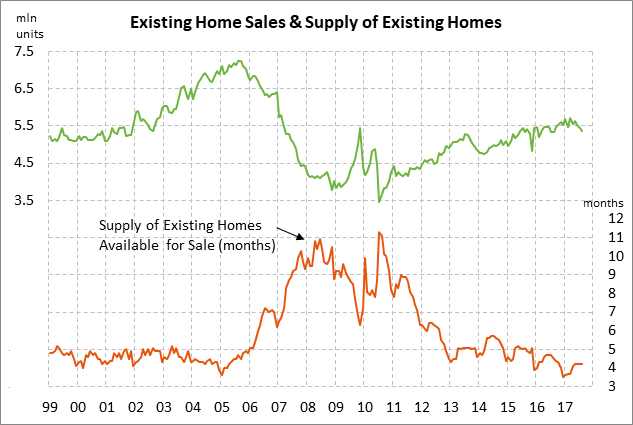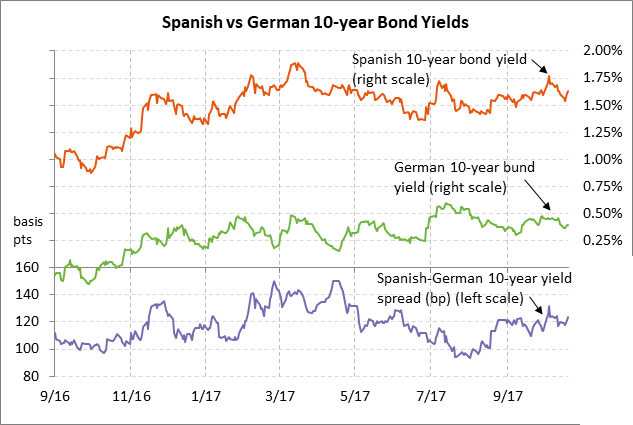- Trump is reportedly leaning towards Powell
- Sep U.S. existing home sales expected to show continued weakness
- Spanish central government proceeds with takeover of Catalonia
- Japanese investors pin hopes on strong Abe showing in Sunday’s election
Trump is reportedly leaning towards Powell — Politico on Thursday reported that Fed Governor Jerome Powell is the “leading candidate” for Fed chair, according to three unnamed administration officials. The Politico report also said that Treasury Secretary Mnuchin, who is leading the search, heavily favors Mr. Powell.
President Trump interviewed Ms. Yellen for reappointment on Thursday. Thursday’s Politico report appeared to be a deliberate trial balloon from the Trump administration to test market reaction to a Powell appointment.
Mr. Trump could now make his announcement at basically any time. An announcement is expected at the latest before Mr. Trump leaves in two weeks on Nov 3 for his 11-day trip to Asia and Hawaii.
The markets in general are likely to receive Mr. Powell favorably since he supports the Fed’s current policy of slow rate hikes and he is fully plugged in with the other Fed officials and staff, meaning little is likely to change at the Fed. The markets, by contrast, would view a Taylor or Warsh appointment as negative since the assumption is that they might want to raise interest rates faster than the current Fed.
The betting odds for Mr. Powell to become the new Fed chair soared by 22 points to 61% after Thursday’s Politico report, according to PredictIt.org. Meanwhile, the odds dropped sharply by -1 point to 16% for Ms. Yellen, -7 points to 14% for Kevin Warsh, and -10 points to 6% for John Taylor. Gary Cohn’s odds rose by +2 points to 7%.
Sep U.S. existing home sales expected to show continued weakness — The market consensus for today’s Sep existing home sales report is for a -0.9% decline to 5.30 million, adding to August’s -1.7% decline to 5.35 million. The Aug report was hurt to some extent by Hurricane Harvey, which made landfall on Aug 25. However, today’s report for Sep will see a negative impact, not only from Harvey, but also from Hurricane Irma, which hit Florida on Sep 10.
U.S. home sales in any case have fallen in four of the last five months and are down by a total of -6.1% from the 10-1/2 year high of 5.70 million units posted in March. Demand for homes continues to be generally strong, but home sales seem to be running into obstacles from high prices and tight availability. There were only 4.2 months worth of homes available for sale in August, which is tighter than the 2000-05 average of 4.5 months and the long-term average of 7.0 months.
Meanwhile, the median price of an existing home in August was $253,500, which is just -4% below the record high of $263,300 posted in June. The price of an existing home has soared by +33% from the housing-bust-low of $154,600 posted in Jan 2012.
Spanish central government proceeds with takeover of Catalonia — Spanish Prime Minister Rajoy on Thursday said that the central government will proceed with activating Article 155 of the Spanish constitution in order to take control of the Catalan regional government and reduce its autonomy. Catalonia’s President Puigdemont responded by saying that the Catalan parliament may now go ahead with a vote for independence since the central government is not willing to negotiate. Any such vote for independence would certainly be declared invalid by Spain’s constitutional court, but it would nevertheless inflame public opinion.
Prime Minister Rajoy on Saturday plans to meet with the ministers in his cabinet to approve the activation of Article 155. The Spanish Senate is then tentatively scheduled to meet this coming Tuesday to vote on approving the use of Article 155 to lift Catalonia’s autonomy.
Catalans are not likely to give up easily in response to a central government takeover. There are likely to be large public protests that could possibly turn violent. Catalan police and bureaucrats may simply ignore or try to block central government orders. The central government will need to send in national officials and police to enforce the takeover.
For the markets, the specter of more unrest will be negative for Spanish stocks and bonds and will have some carry-over effects for Europe as a whole. Spain has already cut its GDP forecasts due to the social unrest in Catalonia. However, the markets on balance seem to be pleased that Prime Minister Rajoy is taking legal measures to quash the independence movement, thereby ensuring that the important economic area of Catalonia will remain part of Spain for the foreseeable future, at least in legal terms.
The iShares Spanish ETF (EWP) on Thursday fell by -0.42%, giving back about half of Wed’s +0.98% rally. The Spanish 10-year government bond on Thursday rose by +1.7 bp to 1.628, but remained well below the recent 7-month high of 1.78%.
Japanese investors pin hopes on strong Abe showing in Sunday’s election — The Japanese stock market in the past several weeks has soared to a new 21-year high mainly because of hopes that Prime Minister Abe’s party will have a strong showing in this Sunday’s national election. The markets are hoping that Mr. Abe will be able to extend his Abenomics program involving easy monetary policy and structural reforms.
The market is expecting Mr. Abe’s LDP party to keep a super-majority in parliament and win about two-thirds of the seats. Anything less than a two-thirds win would likely be viewed negatively by the Japanese stock market.



